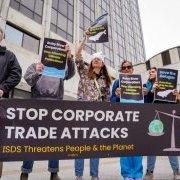31-May-2024
Club of Mozambique
African commodities house ETG has warned Mozambique that it will seek international arbitration in a dispute over the seizure of up to US$60 million’s worth of goods.
27-May-2024
Romania-Insider
Eurohold Bulgaria AD and Euroins Insurance Group AD said they have officially filed a request for arbitration against the government of Romania at the International Centre for Settlement of Investment Disputes in Washington, DC.
10-May-2024
Hindustan Times
Several non-European Union states are keen on finalising bilateral investment treaties with India to boost the potential for investments and to address concerns of investors on matters such as dispute resolution.
10-May-2024
The Conversation
Foreign investors wanting to protect their gains under the controversial new law could hold the country to ransom by threatening a dispute. As a result, they would constrain New Zealand’s democratic ability to exercise its sovereignty, and to protect te Tiriti rights.
3-May-2024
Public Citizen
For half a century, the ISDS system has allowed multinational corporations to run off with billions of taxpayers dollars while allowing them to undermine environmental standards, public health protections, financial regulations, and other sound policies throughout the world.
29-Apr-2024
Common Dreams
In a referendum, Ecuador voted to keep its constitutional ban on using international arbitration and investor-state dispute settlement mechanisms.
21-Apr-2024
Bilaterals.org
On 21 April 2024, the government of Daniel Noboa is holding a referendum in Ecuador to amend the country’s constitution and, in particular, to reactivate the dangerous investor-state dispute settlement mechanism.












